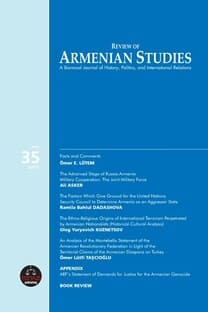Self-determınatıon vs. terrıtorıal ıntegrıty: Ottoman-Armenıan conflıct of 1915 from two perspectıves of statehood
Bu makale yaklaşık 750000 Osmanlı Ermenisinin İttihat ve Terakki yönetimi tarafından sevk ve iskan edilmesini, kendi kaderini tayin hakkı ve toprak bütünlüğü kavramları açısından ele almaktadır. On yıllardır sürmekte olan “soykırım mı? tehcir mi?” tartışmalarına girmeden, makale bu ihtilafa özgün bir açıdan yaklaşarak ayrılıkçı talepleri haklı kılabilecek kendi kaderini tayin hakkının dayandığı meşru temellere ilişkin teorik bir yaklaşım sunmaktadır. Kötü muamele, barışçılık, çoğunluk ve tarihsel imtihan, meşru ayrılıkçılık için teorik önkoşullar olarak tanımlanmaktadır ve 1915 tehcirinin arşivsel bir analizi bu önkoşullardan üçünün Ermenilerin bağımsızlık arayışında bulunmadığı ortaya koyulmaktadır.
Kendi kaderini tayin vs. toprak bütünlüğü: İki farklı devlet oluş perspektifinden 1915 Osmanlı-Ermeni çatışmas ı
This article investigates the 1915 relocation of approximately 750,000 Ottoman Armenians by the İttihat ve Terakki (Union and Progress) administration with respect to the notions of self-determination and territorial integrity. While it remains distant to the decades-old “genocide or relocation?” debate, this paper promises to discuss this controversy from an original angle, and offers a theoretical framework for the legitimate grounds on which the right to self-determination exists to justify secessionist demands. Mistreatment, peacefulness, majority and historical tests are proposed as theoretical prerequisites of legitimate separatism, and an archival analysis of the 1915 relocation suggests that three of these conditions were not satisfied in the Armenians’ pursuit of independence.
___
AKTAN, Gündüz. “The Lausanne Peace Treaty and the Armenian Question.” In The Armenian Question: Basic Knowledge and Documentation, edited by Ömer Engin Lütem , Ankara: Terazi, 2009. DOLOVICH, Sharon. “Legitimate Punishment in Liberal Democracy.” Buffalo Criminal Law Review, Spring 2004. EL QUALI, Abdelhamid. “Territorial Integrity: Rethinking the Territorial Sovereign Right of the Existence of States.” Geopolitics 11:4 (2006) 630- 650. HOLDER, Cindy. “Self-Determination as a Universal Human Right.” Human Rights Review 7:4 (July-September 2006): 5-18. HUNTINGTON, Samuel. Asker zihniyeti. İstanbul: Salyangoz, 2004. GUDELEVICIUTE, Vita. “Does the Principle of Self-determination Prevail over the Principle of Territorial Integrity?” International Journal of Baltic Law 2:2 (2005). KANTOROWITZ, Ernst. “Orta Çağ Siyasi Düşüncesinde ‘Vatan için Ölmek – Pro Patria Mori.” In Devlet Kuramı, edited by Cemal Baki Akal. Ankara: Dost, 2005. NEUBERGER, Benyamin. “National Self-determination: A Theoretical Discussion.” Nationalities Papers 29: 3 (2001): 391-418. Ottoman Census Records, as made available in Turkish State Archives at http://www.devletarsivleri.gov.tr/Forms/pgArchiveBooks.aspx PILLON, Roger. “The Purpose and Limits of Government,” Cato’s Letters, 1999. PREDA, Adina. “The Principle of Self-Determination and National Minorities.” Journal of Dialectical Anthropology 27:3-4 (2003) 205-226. SCHMITT, Carl. “Somut ve Çağa Bağlı bir Kavram olarak Devlet.” In Devlet Kuramı, edited by Cemal Baki Akal. Ankara: Dost, 2005. SUMMERS, James. “The Right of Self-Determination and Nationalism in International Law.” International Journal on Minority and Group Rights 12 (2005) 325-354. The United Nations, Charter of the United Nations and the Statute of the International Court of Justice (1945). Accessed June 03, 2010 http://www.un.org/en/documents/charter/ The United Nations, Convention on the Prevention and Punishment of the Crime of Genocide (1948), accessed February 06, 2011, http://www.hrweb.org/legal/genocide.html The United Nations, International Covenant on Economics, Social and Cultural Rights (1966), accessed June 04, 2010, http://www.unhchr.ch/html/menu3/b/a_cescr.htm UZ, Abdullah. “Teori ve Uygulamada Self-Determinasyon Hakkı.” Uluslararası Hukuk ve Politika 3: 9 (2007): 60-81.- ISSN: 1303-5304
- Yayın Aralığı: Yılda 2 Sayı
- Başlangıç: 2002
- Yayıncı: Terazi Yayıncılık Basım Dağıtım Danışmanlık Eğitim Organizasyon Matbaacılık Kırtasiye Tic. Ltd. Şti.
Sayıdaki Diğer Makaleler
Caucasus 2012 drılls: Russıa’s effıcacy attempts ın the caucasus as part of ıts securıty strategıes
(ERMENİLER: FAİLLER VE KURBANLAR)
Armenıan relocation and internatıonal law
HİSTORİOGRAFİNİN KATEGORİLEŞTİRİLMESİ: TARİH BOYUNCA TÜRK-ERMENİ İLİŞKİLERİ
ERMENİ TEHCİRİ VE ULUSLARARASI HUKUK
KAFKAS 2012 TATBİKATI: GÜVENLİK STRATEJİLERİ KAPSAMINDA RUSYA’NIN KAFKASLARDA ETKİNLİK DENEMESİ
